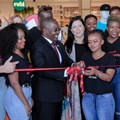If you've ever purchased a Cotton On Foundation product sold near the till point of a Cotton On Group store, you've contributed to raising the equivalent of R1bn for educational projects across South Africa, Uganda, Thailand and Australia over the past 10 years.
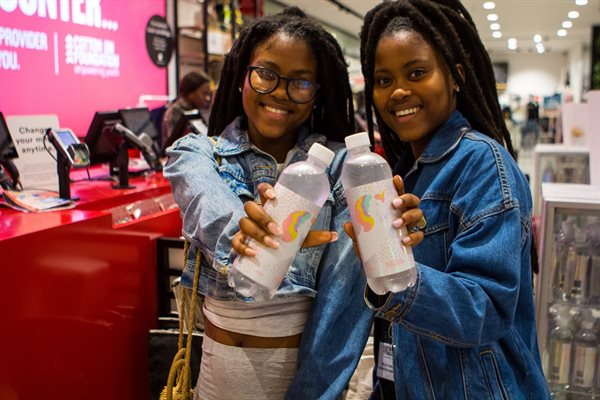
Cotton On ambassadors, the Sobekwa twins, with Cotton On Foundation merchandise.
The Cotton On Foundation is the dedicated philanthropic arm of the Australian-born Cotton On Group, the global retailer operating the various Cotton On brands, as well as Rubi, Factorie, Supré, and gifting and stationery brand Typo.
In lieu of simply having a CSI-focused department within the group, the decision was made to create a fully-fledged and staffed non-profit, a setup that allows the company to take on long-term projects and give them the attention they deserve.
Removing barriers to quality education
The Foundation is focused on empowering youth through the delivery of quality educational projects that assist in breaking the cycle of poverty. “We know that our responsibility goes far beyond selling clothes. The Foundation was set up to both fundraise and oversee education projects in under-resourced regions,” explains Tara Stretch, South Africa manager of the Cotton On Foundation.
Cotton On Foundation products – the trendy tote bags, tins of mints, printed packs of tissues, and bottled water – are found in over 1,500 Cotton On Group stores around the world. Often enthusiastically sold as add-ons in store, these items form a vital part of the Foundation’s fundraising strategy.
Globally, the Group sells one Foundation item every 2 and a half seconds, with 100% of the proceeds funneled into the non-profit’s projects. In South Africa specifically, R33.6 million has been raised from the sale of Foundation items in store, all of it going towards educational projects in some of SA’s most at-risk communities.
Locally, the Foundation’s work is perhaps most lauded in the township of KwaMashu in KwaZulu-Natal. Reflecting South Africa’s historic spatial inequality, KwaMashu is located just under 20km away from the upmarket resort town of Umhlanga. Though boasting a vibrant performing arts scene, the KwaMashu community grapples with social issues like unemployment, violence and abuse.
Over the last few years, the Cotton On Foundation has been working with eThekwini Primary School, located in the heart of KwaMashu, to create an additional 1,280 educational placements, made possible through extensive infrastructure upgrades, which the non-profit has funded and managed.
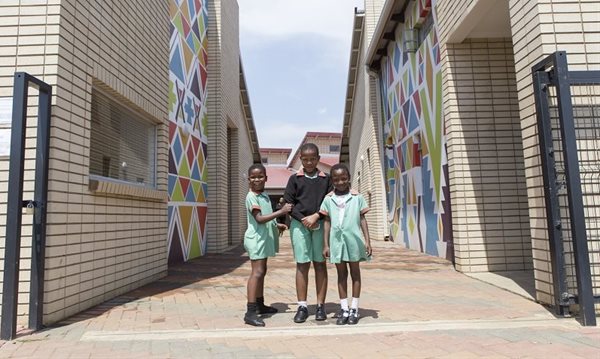
Simesihle Nene, Olwethu Mthethwa, Nonduduzo Makhanya at eThekwini Primary School.
The latest development includes the addition of 16 new classrooms. While previously the school was only able to cater to students from Grade R to four, the renovation will allow learners to complete their final years of primary school, without having to leave their community, before transitioning to high school.
Further upgrades to the school include 37 new ablution facilities, two kitchens, a staffroom, tuckshop, two fully-equipped playgrounds and a new admin block for staff.
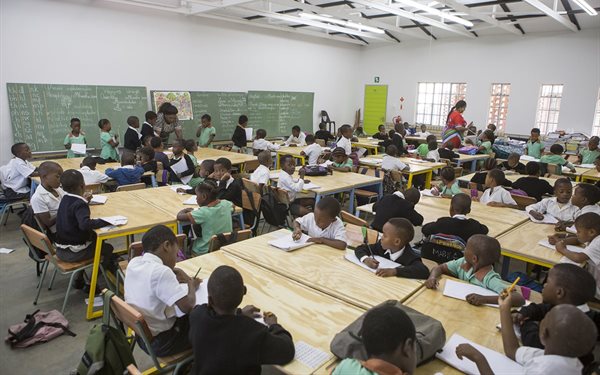
Grade 1 eThekwini Primary learners
A considered approach
The Foundation prides itself on adopting a holistic approach to its projects, ensuring they’re multi-faceted, scalable and sustainable. “We don’t just cut cheques, we’re about executions - from conception and design, to build,” says Stretch.
Any barriers preventing children from accessing quality education are analysed and addressed. “Quality education is about more than just upgraded facilities. It requires skilled and supported staff, good nutrition and programmes that empower learners,” Stretch adds.
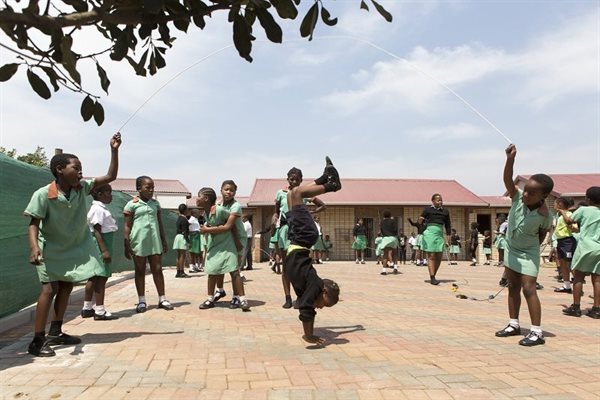
Ethekwini learners playing
In line with this belief, teachers at eThekwini Primary are provided with additional training and members of the surrounding community have access to the Foundation’s education-based Nutrition Mission programme, which covers basic nutrition, common health problems, hygiene, kitchen equipment and safety, as well as practical cooking lessons.
Late last month, the Foundation officially announced Dr JL Dube High School – located just 1.5km away from eThekwini Primary – as its second South African school project. The high school accommodates over 1,200 children in Grade 8 to 12, but current facilities are overcrowded, rundown and under-resourced.
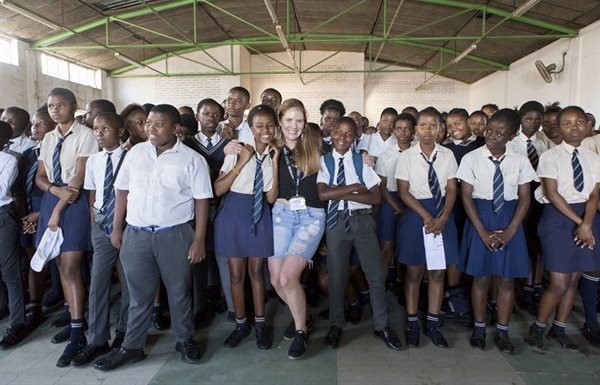
Tara Stretch with learners at the official announcement at Dr JL Dube High School.
As the Foundation’s new partner, Dr JL Dube High School is set to receive extensive upgrades,additional teacher training and access to nutrition and feeding programmes. Estimated to be complete at the end of 2020, the high school will also be the ideal pathway into secondary school for students at nearby eThekwini PrimarySchool.
“With our move into supporting a secondary school, we're really focused on the educational pathway for these children, ensuring they can move through secondary education, and look towards vocational and tertiary opportunities. These kids are our future workforce. If we invest in getting them to be educated and motivated individuals, the proof's going to be in the pudding,” Stretch told Bizcommunity.
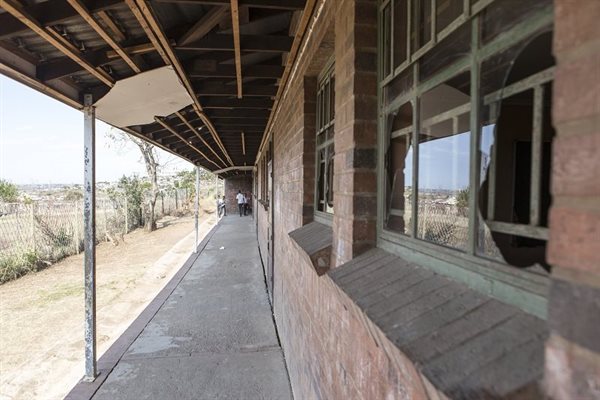
Dr JL Dube High School as ti stands today.
The Cotton On Group will also be employing selected students from JL Dube High School as casual staff for Durban stores during the upcoming festive season.
Stretch explains that both schools were selected as partners because they demonstrated high potential – strong and dedicated staff in leadership, and motivated students, especially considering the limited resources at their disposal.
Here, Stretch shares more on the Foundation’s work in South Africa.
Why has the Cotton On Foundation chosen to focus its efforts on improving access to quality education?
We believe it's the key to these children achieving their full potential in life and ending their cycle of poverty. A quality education gives every child the potential to change his or her world to realise their dreams.
Tell us a bit about the strategy behind the Foundation products sold in store. How do you choose what items to sell and what is the thought process behind their design?
We focus on everyday items, but with a twist. They’re last-minute convenience items or add-ons to purchases. We work in conjunction with our trends team in Australia, and the Foundation has a product development team as well. We work very closely with the brands and we usually build up our products within a programme, so they support seasonality in terms of their design.
We've got beautiful fronds on our tissues, we've got gingham and tie-dye, which are all strong prints and trends that you're going to see pulling through in fashion this summer. We make sure our products fit in with those trends.
Can you expand on the criteria that's reviewed when selecting schools and organisations to work with?
We're really looking for like-minded organisations that share the same values and are doing fantastic work in a specific space.
We also look for experts in certain fields to support us on our quality education model. For example, we’ve partnered with a local NGO called Khanyisa Inanda Seminary Projects and they are supporting us with our teacher development and training. We don't profess to be experts at every touchpoint, but we partner with the best of the best.
We also partner with the Department of Education. These schools just need a boost and a hand to hold to ensure they can become more successful.
In South Africa we've developed a model called the 'township model'. We met eThekwini Primary School almost by chance when we partnered with the Nelson Mandela Foundation back in the early days, and that's how the model was born.
Strong leadership is key, as well as a vested interest from the community, so we put in a lot of time and effort early on into communicating with the community to understand whether this is something that they really want and believe in, because we all want to be walking the same path. Our model is learner-centric, so the child is at the heart of every decision that we make.
Will the programme be expanding in SA beyond KZN?
Absolutely. We are currently doing due diligence in Gauteng. Watch this space!
What is your message for corporate South Africa in terms of getting involved with projects like these?
Roll up your sleeves and be willing to get your hands dirty. Partner with experts and don't be afraid to take the next step. Just do it!
For more information on Cotton On Foundation projects, click here.










































